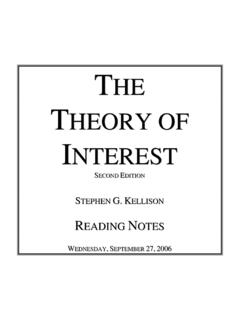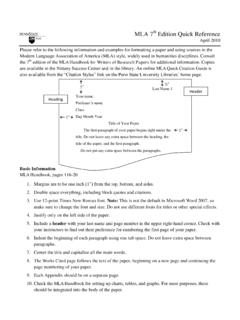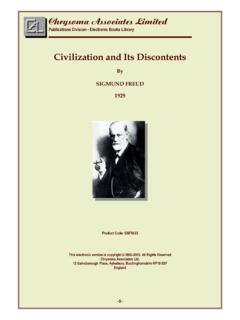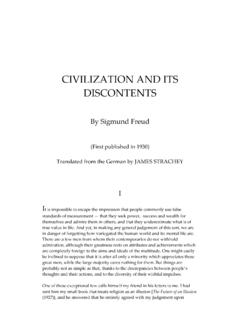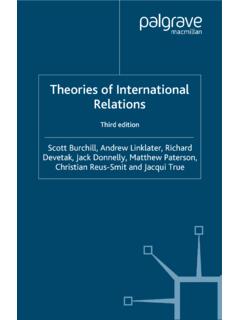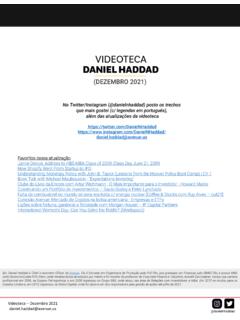Transcription of Essential Readings in World Politics
1 Essential Readings in World Politics SECOND EDITION The Norton Series in World Politics Jack Snyder, General Editor Essentials of International Relations Karen A. Mingst From Voting to Violence: Democratization and Nationalist Conflict Jack Snyder Prosperity and Violence: The Political Economy of Development Robert H. Bates Triangulating Peace: Democracy, Interdependence, and International Organizations Bruce Russett and John Oneal The Tragedy of Great Power Politics John Mearsheimer Lenses of Analysis Richard Harknett Coming soon: Stephen Krasner on international political economy Bahan asal darl Arklb Negara Malaysia Essential Readings in World Politics SECOND EDITION EDITED BY KAREN A. MINGST AND JACK L. SNYDER Copyright 2004, 2001 by W. W. Norton 8c Company, Inc. CONTENTS PREFACE ix STEPHEN M.
2 WALT "International Relations: One World , Many Theories" 4 JOHN LEWIS GADDIS "History, Theory, and Common Ground" 11 THUCYDIDES "Melian Dialogue," adapted by Suresht Bald FROM Complete Writings: The Peloponnesian War 18 IMMANUEI. KANT "TO Perpetual Peace: A Philosophical Sketch," PROM Perpetual Peace, and Other Essays on Politics , History, and Morals 20 WOODROW WILSON "The Fourteen Points," Address to the Congress, 8 January 1918 26 GEORGE R KENNAN ("X") "The Sources of Soviet Conduct" 28 JOHN LEWIS GADDIS "The Long Peace: Elements of Stability in the Postwar International System" 33 v vi CONTENTS HANS MORGENTHAU JOHN MEARSHEIMER MICHAEL W. DOYLE ANDRE GUNDER FRANK J. ANN TICKNER MARTHA FINNEMORE "A Realist Theory of International Politics " and "Political Power," FROM Politics Among Nations: The Struggle for Power and Peace 49 "Anarchy and the Struggle for Power," FROM The Tragedy of Great Power Politics 54 "Liberalism and World Politics " 73 "The Development of Underdevelopment" 86 "Man, the State, and War: Gendered Perspectives on National Security," FROM Gender in International Relations: Feminist Perspectives on Achieving Global Security 94 "Constructing Norms of Humanitarian Intervention" 102 HEDLEY BULL HANS MORGENTHAU IMMANUEL WALLERSTEIN ROBERT JERVIS "Does Order Exist in World Politics ?
3 " FROM The Anarchical Society: A Study of Order in World Politics 120 "The Balance of Power," "Different Methods of the Balance of Power," and "Evaluation of the Balance of Power," FROM Politics Among Nations: The Struggle for Power and Peace 124 "The Rise and Future Demise of the World Capitalist System: Concepts for Comparative Analysis" 130 "The Compulsive Empire" 138 STEPHEN D. KRASNER "Sovereignty" 143 ANNE-MARIE SLAUGHTER "The Real New World Order" 149 ROBERT I. ROTBERG "Failed States in a World of Terror" 157 SAMUEL P. HUNTINGTON "The Clash of Civilizations?" 163 EDWARD W. SAID GRAHAM E. FULLER "The Clash of Ignorance" 170 "The Future of Political Islam" 173 CONTENTS VII MARGARET G. HERMANN AND JOE D. HAGAN ROBERT JERVIS CYNTHIA ENLOE "International Decision Making: Leadership Matters" 182 "Hypotheses on Misperception" 189 "The Personal Is International," FROM Bananas, Beaches, and Bases: Making Feminist Sense of International Politics 202 MICHAEL J.
4 GLENNON EDWARD C. LUCK ANNE-MARIE SLAUGHTER IAN HURD MARGARET E. KECK AND KATHRYN SIKKINK SAMANTHA POWER HENRY A. KISSINGER KENNETH ROTH G. JOHN IKENBERRY JOHN J. MEARSHEIMER "Why the Security Council Failed" 208 Responses 219 "Transnational Advocacy Networks in International Politics : Introduction" and "Human Rights Advocacy Networks in Latin America," FROM Activists Beyond Borders: Advocacy Networks in International Politics 222 "Bystanders to Genocide: Why the United States Let the Rwandan Tragedy Happen" 233 "The Pitfalls of Universal Jurisdiction" 253 "The Case for Universal Jurisdiction" 258 "Is American Multilateralism in Decline?" 262 "The False Promise of International Institutions" 283 Viii CONTENTS CARL VON CLAUSEWITZ THOMAS C SCHELLING ROBERT JERVIS SCOTT D.
5 SAGAN AND KENNETH N. WALTZ JOHN MUELLER MICHAEL W. DOYLE BARRY R. POSEN AUDREY KURTH CRONIN ROBERT A. PAPE "War as an Instrument of Policy," FROM On War 297 "The Diplomacy of Violence," FROM Arms and Influence 301 "Cooperation under the Security Dilemma" 309 "Indian and Pakistani Nuclear Weapons: For Better or Worse?" FROM The Spread of Nuclear Weapons 322 "The Essential Irrelevance of Nuclear Weapons: Stability in the Postwar World " 341 "International Intervention," FROM Ways of War and Peace 347 "The Security Dilemma and Ethnic Conflict" 357 "Behind the Curve: Globalization and International Terrorism" 367 "The Strategic Logic of Suicide Terrorism" 382 ROBERT GILPIN STEPHEN D. KRASNER BRUCE R. SCOTT JESSICA EINHORN JOSEPH E. STIGLITZ "The Nature of Political Economy," FROM Power and the Multinational Corporation 403 "State Power and the Structure of International Trade" 410 "The Great Divide in the Global Village" 421 "The World Bank's Mission Creep" 430 "The Way Ahead," FROM Globalization and its discontents 437 DAVID HELD AND ANTHONY MCGREW, WITH DAVID GOLDBLATT AND JONATHAN PERRATON THOMAS FRIEDMAN AMARTYA SEN "Globalization" 462 "The Backlash" FROM The Lexus and the Olive Tree: Understanding Globalization 471 "Universal Truths: Human Rights and the Westernizing Illusion" 477 PREFACE This reader is a quintessential collaborative effort between the two co-editors and Ann Marcy of W.
6 W. Norton. In a flurry of e-mails during 2003, the co-editors suggested articles for inclusion, traced the sources, and rejected or ac-cepted them, defending choices to skeptical colleagues. It became apparent during the process that the co-editors, while both international relations schol-ars, read very different literatures. This book represents a product of that collab-orative process and is all the better for the differences. The articles have been selected to meet several criteria. First, the collection is designed to augment and amplify the core Essentials of International Relations text (third edition) by Karen Mingst. The chapters in this book follow those in the text. Second, the selections are purposefully eclectic, that is, key theoretical articles are paired with contemporary pieces found in the popular literature.
7 When possible articles have been chosen to reflect diverse theoretical perspec-tives and policy viewpoints. The articles are also both readable and engaging to undergraduates. The co-editors struggled to maintain the integrity of the chal-lenging pieces, while making them accessible to undergraduates at a variety of colleges and universities. Special thanks go to those individuals who provided reviews of the first edi-tion of this book and offered their own suggestions and reflections based on teaching experience, Our product benefited greatly from these evaluations, al-though had we included all the suggestions, the book would have been thou-sands of pages! Ann Marcy orchestrated the process, reacting to our suggestions, mediating our differences, and keeping us "on task." To her, we owe a special thanks.
8 Andrea Haver guided the manuscript through the permissions and edit-ing process, a very labor-intensive task. Essential Readings in World Politics SECOND EDITION APPROACHES In Essentials of International Relations, Karen Mingst introduces various theories and approaches used to study international relations. In this section, Stephen Walt, a professor of international relations at Harvard's Kennedy School of Government, provides a brief overview of these theories and sets them in the context of new is-sues that are being debated in the field. The scholars thinking about international relations and debating these issues are divided by both theoretical and method-ological differences. Recognizing these divisions in a symposium on history and theory in a special issue of International Security, John Lewis Gaddis, a promi-nent diplomatic historian at Yale University, acknowledges that historians pay too little attention to methodology but chastises political scientists for using methods that overgeneralize by searching for timeless laws of Politics .
9 Finding common ground between these divergent approaches, he argues that students of Politics should use the past not to try to predict the future, but to help people understand political developments as they unfold. Both historical analysis and philosophical discourse contribute to the study of international relations. The historian of the Peloponnesian War, Thucydides, uses the Melian Dialogue. In this classic realist/idealist dilemma, the leaders of Melos ponder the fate of the island, deciding whether to fight their antagonists, the Athe-nians, or to rely on the gods and the enemy of Athens, the Lacedaemonians (also known as Spartans), for their safety. Centuries later, in 1795, the philosopher Im-manuel Kant posited that a group of republican states with representative forms of government that were accountable to their citizens would be able to form an effec-tive league of peace.
10 That observation has generated a plethora of theoretical and empirical research known as the democratic peace debate. In Essentials, Mingst uses the debate to illustrate how political scientists conduct international relations research. Michael Doyle's article on "Liberalism and World Politics ," excerpted in Chapter 3, sparked the contemporary debate on this topic. And an important statement on the status of that debate is presented in Bruce Russett and John Oneal's Triangulating Peace: Democracy, Interdependence, and International Organizations (2002) which integrates a comprehensive body of research findings on the democratic debate. 4 CHAPTER 1 APPROACHES STEPHEN M. WALT International Relations: One World , Many Theories Why should policymakers and practition-ers care about the scholarly study of in-ternational affairs?




